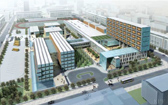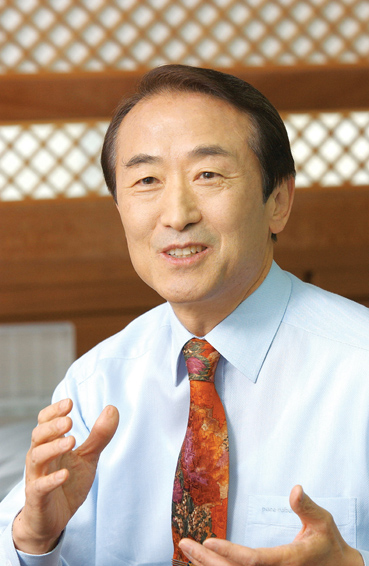Development of IFEZ Being
Pushed in Earnest
Songdo District gains momentum
 Marking the third anniversary, the Incheon Free Economic Zone Authority (IFEZA) has launched or will soon launch such mega-projects as the planned New Songdo City International School (NSCIS) in the Incheon Free Economic Zone (IFEZ), one of the nation's three Free Economic Zones. The following are the excerpts of a written interview with IFEZA CEO Lee Hwan-kyun.
Marking the third anniversary, the Incheon Free Economic Zone Authority (IFEZA) has launched or will soon launch such mega-projects as the planned New Songdo City International School (NSCIS) in the Incheon Free Economic Zone (IFEZ), one of the nation's three Free Economic Zones. The following are the excerpts of a written interview with IFEZA CEO Lee Hwan-kyun.
Question: Will you tell our readers about the current status of the Incheon Free Economic Zone development scheme and the 2006 action plan?
Answer: The IFEZ comprises three areas ¡ª Songdo, Cheongna and Yeongjong districts. With a projected population of 487,000, the IFEZ will be developed at a cost of 14,761 billion won during the period between 2003 and 2020.
First, take a look at the Songdo District development plan. Large-size projects in the International Business District have been launched one after another. Early this year, the planned New Songdo International School project has already broken ground , 65-floor Asia Trade Tower, Central Park, an ecology center, an international hospital, office buildings, hotels and department stores will break ground within this year.
The reclamation project for changing the landscape of Songdo will pick up speed. The seventh section covering 760,000 pyeong or 2.5 million sq. meters and the sixth and eighth sections, encompassing 1.92 million pyeong or 53.36 million sq. meters will break ground in April and March, respectively. One pyeong equals to 3.3 sq. meters.
Major projects of the Yeongjong development district include 5.7 million pyeong (18.81 million square meter) area development project, Yongyu and Muii tourism complex and Unbuk tourism/leisure center projects. A compensation process for the Yeongjong area development project will be launched in December.
Leading projects for building up infrastructure will break ground in July as part of the plan to develop the Yongyu and Muii areas, covering 2.13 million pyeong, by capitalizing on pristine tourist resources.
 Infrastructure projects for the 820,000-pyeong Unbuk tourism/leisure center will be launched in June. Approach and viaduct bridge sections of the planned Incheon Bridge will be undertaken.
Infrastructure projects for the 820,000-pyeong Unbuk tourism/leisure center will be launched in June. Approach and viaduct bridge sections of the planned Incheon Bridge will be undertaken.
A plan to develop the Cheongna District as an international tourism and entertainment area will go into a high gear with the full-fledged launch of infrastructure projects in the early of 2006. In particular, infrastructure projects for international business and sports/leisure facilities will be launched in earnest, including the ones for the first and second phases. Projects for such automotive facilities as CTT and R&D is expected to break ground in June.
The Cheongna District encompasses a combined 5.41 million pyeong. Out of the total, 420,000 pyeong and 150,000 pyeong are set aside for a floricultural complex of Korea Rural Community & Agriculture Corporation and an R&D center of GM Daewoo Auto & Technology Co., respectively. The remaining 4.84 million pyeong will be used for the planned Asian Village, a theme park, a golf course, a residential area, an international school, an international hospital and large-size shopping mall.
Q: Will you elaborate on the current status and future plans of such infrastructure projects as the Incheon Bridge and Incheon International Airport expansion projects that are now under construction?
A: Construction of the projected Incheon Bridge began last June and will likely be completed by October 2009 at a cost of 1,270 billion won. The six-lane bridge, 12.3 km long, will be the longest maritime bridge in Korea. The bridge has been put on the list of 10 wonders of the construction world, announced by the British construction journal, Construction News.
Phase II of the Incheon International Airport expansion project is to be finished by July 2008. The completion of the project will boost the airport's edge, making it an airport logistics center in Northeast Asia.
Such projects as the ones on making the Gyeongin (Seoul-Incheon) Expressway straight, construction of the planned 3rd Gyeongin Expressway and 2nd Circular Ring Expressway and railway network are in the pipeline to make logistics flow of the IFEZ area more smoother.
Q: Will you introduce IFEZ's plans to create an environment conducive for attracting foreign investments in value-added industries and allure FDIs in consideration of the geopolitical aspects of the IFEZ?
A: The strongest advantage of the IFEZ is that it has Incheon International Airport emerging as a global hub airport. The IFEZ, capitalizing on a combination of sea and air logistic services, has more growth potential than free economic zones in Busan and Gwangyang and other parts of the world.
Incheon is in close proximity with China and in a distance of a 30-minute drive with a market of the Seoul metropolitan area with a population of 20 million, serving as a logistics center linking Seoul and China.
Located at the heart of the Korean Peninsula and closer to North Korea, Incheon has optimum conditions for establishing a bridgehead of promoting inter-Korean exchanges.
 Making the most of these geopolitical advantages, the IFEZ is striving to realize a goal of constructing a free international city of the 21st century to make it a Northeast Asia hub of business, logistics, information technology, bio-technology, R&D and leisure.
Making the most of these geopolitical advantages, the IFEZ is striving to realize a goal of constructing a free international city of the 21st century to make it a Northeast Asia hub of business, logistics, information technology, bio-technology, R&D and leisure.
The IFEZ is pushing ahead with a strategy of differentiating rivals by making it a ubiquitous, advanced city with ecological features and latest transportation means. To this end, the IFEZ is concentrating on building up infrastructure for attracting foreign investments.
Q: Will you give the details of the current status of FDIs the IFEZ has so far attracted?
A: The IFEZA signed 24 agreements worth $27.3 billion as of February 28 ¡ª 11 contracts worth $14,703 million, six MOUs worth $11,955 million and seven letters of intent (LOI) worth $648 million.
The IFEZA has made a strong showing in attracting FDIs as it has agreed to accommodate a Yonsei University campus, has signed an $11 billion MOU with Portman Holdings and inked a contract with Gudel Group AG of Switzerland on the construction of a robot plant in Songdo so far this year.
On February 6, Portman Holdings of the United States and the Incheon Metropolitan Government inked an MOU on the development of the sixth and eighth sections of the Songdo District, encompassing 1.92 million pyeong. The agreement calls for constructing a 151-floor twin tower and developing its neighborhood area into a city of new concept combining business, commerce and residential purposes, designed to accommodate hotels, cultural facilities, maritime and leisure facilities.
The first phase of the Yonsei University project calls for constructing a bachelor's degree campus and a dormitory on a lot of 280,000 pyeong by 2010. Starting the 2010 academic year, all freshmen will take bachelor's degree courses on the Sondgo campus of Yonsei University. The second phase, starting in 2011 or after, involves construction of such facilities as Science & Engineering R&D Park, Yonsei University's sister university campus, and research institutes on North Korean and Northeast Asian studies.
 Besides, Gudel Group AG of Switzerland signed a $2.5 million contract to build an industrial robot plant in the Songdo Knowledge and Information Complex. The IFEZA's efforts to attract FDIs have begun to bear fruit in earnest this year.
Besides, Gudel Group AG of Switzerland signed a $2.5 million contract to build an industrial robot plant in the Songdo Knowledge and Information Complex. The IFEZA's efforts to attract FDIs have begun to bear fruit in earnest this year.
Q: Would you introduce mid- and long-term strategies designed to attract foreign investments?
A: The IFEZA is shifting from the existing supplier-oriented foreign investment attraction strategy to a client-oriented one tailored to target companies following an analysis of potential investors'concerned fields, investment trends, whether they have invested into Korea and their views toward China.
The authority is making concerted efforts with the central government to conduct intensive foreign investment attraction activities by linking target companies'investment strategies, R&D, production and marketing and other corporate jobs. It plans to focus on target companies by establishing systems designed to ensure an efficient management of major projects and supporting regimes.
The IFEZA is focusing on attracting investments into key facilities in a bid to maximize the effectiveness of corporate investments as well as building up a ubiquitous-IT cluster and biomedical hub in a bid to set up an innovative cluster of global corporations.
Under the mid- and long-term investment allurement strategies, project managers will be assigned to target corporations who have the potential to invest. The overseas networks of the Ministry of Finance and Economy, the Ministry of Commerce, Industry and Energy, Korea Land Corporation, Gale and other major investors will be available. The IFEZA will initially focus on realizing goals of attracting major facilities, and spreading the effectiveness of investments in association with strategies designed to develop IT, logistics and other next-generation industries.
Q: What do you want the people to do in connection with the development of the IFEZ?
A: A survey of 1,000 Incheon citizens, conducted by a research institute between February 10 and February 11, showed that 32.8 percent of the respondents cited consensus among Incheon citizens and people as key conditions for the successful development of the IFEZ, followed by 21.7 percent, who mentioned expanded support from the central government. And 20.9 percent noted the need for institutional innovations like the relaxation of restrictions.
Seven out of every 10 Incheon citizens expect the successful development of the IFEZ, and they cited a public consensus as a factor essential for realizing that goal.
Q: What steps do you want the central government to take to give assistance to the development of the IFEZ?
A: The free economic zone, being developed as part of next-generation economic development strategies, requires special concern and inter-ministry support from the central government. The central government needs to pay a more concern on the IFEZ and concentrate on national capabilities by expanding budgetary supports and tackling administrative restrictions.
In particular, projects for developing the IFEZ are state projects demanding massive investments. In order to build up infrastructure corresponding to the standards of international cities, the central government will have to raise its financial support rate from the current 50 percent to 100 percent. The IFEZ needs to be excluded from the scope of restrictions imposed in the Seoul metropolitan area so as to make its efforts to attract foreign investments a success.
As foreign countries do, domestic companies will have to be given the same incentives as foreign counterparts in the free economic zone, paying the way for world-class local companies to settle there. nw
IFEZA CEO Lee Hwan-kyun tours construction sites at Songdo District, part of the Incheon Free Economic Zone. (Far right) Artist's conception of the planned New Songdo City International School.
IFEZA CEO
Lee Hwan-kyun
3Fl, 292-47, Shindang 6-dong, Chung-gu, Seoul, Korea 100-456
Tel : 82-2-2235-6114 / Fax : 82-2-2235-0799